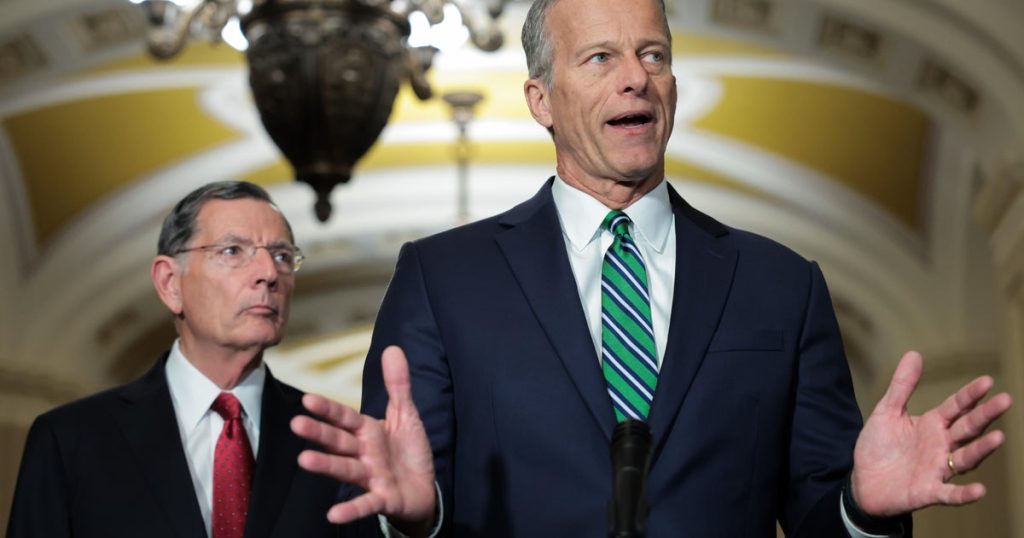Senate Democrats recently halted a significant procedural vote concerning a groundbreaking regulatory bill for cryptocurrency, known as the GENIUS Act. Amid increasing concerns about connections between the digital asset sector and the Trump family, support for the legislation has notably diminished. The measure, aimed at establishing a regulatory framework for stablecoins, failed to secure the necessary votes, highlighting the ongoing tensions in bipartisan political cooperation regarding cryptocurrency regulations.
| Article Subheadings |
|---|
| 1) Overview of the GENIUS Act |
| 2) Political Dynamics and the Vote Outcome |
| 3) Concerns Raised by Senate Democrats |
| 4) The White House’s Stance on Cryptocurrency Regulation |
| 5) Future Implications for Cryptocurrency Legislation |
Overview of the GENIUS Act
The GENIUS Act, introduced in the Senate, aims to create a comprehensive regulatory framework specifically for stablecoins— a type of cryptocurrency pegged to the value of traditional assets like the U.S. dollar. This legislation is significant as it seeks to integrate digital currencies into the wider financial system, providing regulatory assurance and potentially alleviating market volatility. Initially, the bill received bipartisan support and advanced out of the Senate Banking Committee in March, reflecting a growing interest in regulating the burgeoning crypto market. However, hesitation from various Democratic factions has led to its current standstill, complicating the regulatory landscape.
Political Dynamics and the Vote Outcome
Last Thursday’s vote, which saw the bill fail by a narrow margin of 48 to 49, illustrates the fractious nature of current party dynamics in Congress. Despite bipartisan efforts throughout the drafting process, two Republican Senators, Rand Paul of Kentucky and Josh Hawley of Missouri, sided with all Democrats against the bill. The defeat was underscored by mounting skepticism regarding the connections between cryptocurrency and the Trump family’s business dealings, particularly the recent significant investment by an Abu Dhabi-backed firm in a crypto enterprise associated with the Trump family. This mere association was enough to stir doubts among Democrats, contributing to the bill’s inability to achieve the required 60 votes for advancement.
Concerns Raised by Senate Democrats
Several prominent Democratic leaders have voiced significant objections to the current iteration of the GENIUS Act. Among them is Elizabeth Warren, the ranking member on the Senate Banking Committee, who articulated fears surrounding provisions in the bill that may inadvertently facilitate corruption linked to Donald Trump and undermine consumer protections. In a media briefing, she explained that the legislation could expose taxpayers to further risks, suggesting that it might lead to adverse economic consequences for the general public while benefiting wealthy individuals and corporations. Warren indicated that ongoing discussions might eventually yield a version that incorporates essential consumer safeguards, which could rally a significant majority for the newly modified legislation.
The White House’s Stance on Cryptocurrency Regulation
The White House chimed in amid the turmoil surrounding the GENIUS Act. A spokesperson asserted that Donald Trump‘s financial interests were carefully managed through a trust, mitigating any allegations of conflicts of interest. The administration has reiterated its commitment to establishing the United States as a hub for cryptocurrency innovation, emphasizing that any stablecoin legislation should be passed on a bipartisan basis. The White House believes that appropriate regulation is essential for navigating this rapidly evolving financial landscape. This sentiment was echoed by Senate Majority Leader John Thune, who underscored the importance of bipartisan collaboration in refining the legislation rather than outright rejection. He argued for an open legislative process, asserting that constructive negotiations should continue rather than intrude into partisan conflict.
Future Implications for Cryptocurrency Legislation
As the legislative attempts surrounding the GENIUS Act continue, the implications for the broader cryptocurrency landscape remain significant. The failure to pass this measure suggests a growing divide in political opinion on the regulation of digital assets. Many in the Senate are pressing for more time to review the implications of the act thoroughly. Additionally, the ongoing negotiations might lead to compromises that could either reshape the current bill or lay foundational principles for future legislative efforts. The discourse around cryptocurrency regulation is crucial, not only for financial markets but also for consumer protection and economic stability. It is expected that ongoing evaluation will pave the way for future bills, potentially moving beyond the contentious political atmosphere that has characterized recent discussions.
| No. | Key Points |
|---|---|
| 1 | The GENIUS Act aims to create regulations for stablecoins. |
| 2 | The bill recently failed to gather sufficient Senate votes. |
| 3 | Concerns focus on the bill’s potential links to the Trump family’s business dealings. |
| 4 | The White House advocates for bipartisan support for crypto regulations. |
| 5 | Future discussions on the legislation could reshape cryptocurrency regulation in the U.S. |
Summary
The recent procedural vote on the GENIUS Act underscores the complexities of cryptocurrency regulation in the current political climate. With bipartisan discord and growing skepticism surrounding financial interests associated with prominent political figures, the initiative faces significant obstacles. Moving forward, the evolving discourse surrounding crypto legislation has the potential to shape the regulatory landscape significantly while emphasizing the need for balanced consumer protection and financial innovation.
Frequently Asked Questions
Question: What is the GENIUS Act?
The GENIUS Act is a proposed legislation aimed at establishing a regulatory framework for stablecoins, a type of cryptocurrency that is pegged to the value of traditional assets.
Question: Why did the GENIUS Act fail to advance in the Senate?
The bill was defeated due to a lack of bipartisan support, with concerns particularly about its connection to the Trump family’s business interests affecting Democratic legislators’ stances.
Question: What are stablecoins?
Stablecoins are cryptocurrencies designed to have a stable value by being pegged to traditional currencies or assets, such as the U.S. dollar, to minimize volatility in the market.
